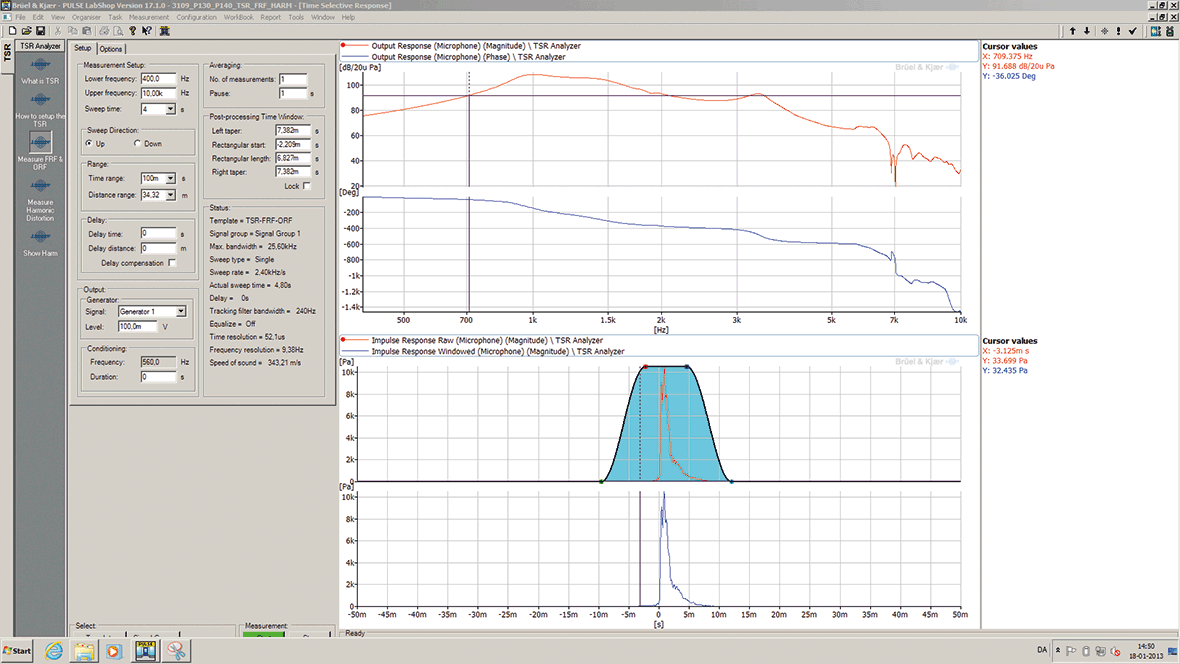TYPE 7797
PULSE - Basic Electroacoustic
PULSE Software designed to evaluate the electroacoustic performance of audio devices, such as speakers, telephones, and smart devices.
Demande de devisPULSE Basic Electroacoustics software enables measurement of the output response and frequency response of electroacoustic transducers such as microphones and speakers. As well as performing all basic electroacoustic measurements, it is the foundation module for our more advanced electroacoustic testing software options.
USE SCENARIOS
- Audio engineers researching, measuring and documenting acoustical designs during development, pre-qualification, and manufacturing
- Benchmarking the acoustical performance of electroacoustic transducers such as speakers and headphones
- Evaluating acoustical accuracy of hydrophones, hearing aids, headsets, telephones, microphones, loudspeakers
- Sample testing of electroacoustic transducers during production, such as tolerance checking of speaker drivers, for quality assurance
INTRODUCTORY PACKAGE WITH OPTIONS
A range of additional software modules build on the fundamental abilities of this software:
- Distortion testing software
- Directional response testing software
- Thiele/Small calculation software
- Product-specific test procedures
- Automation and data management
The complete package of PULSE Basic Electroacoustics and all of these modules is available separately as PULSE Electroacoustics Type 7907-S1. See the product data sheet for more.
IN USE
This software allows accurate measurements, even in a noisy environment. It can measure a time-selective frequency response using a swept-sine technique, which enables it to remove reflections. It can make simulated free-field measurements of basic output response and frequency response, which allows evaluation of loudspeakers in a normal reverberant environment, thus avoiding the need for an anechoic chamber.
Multiple input channels allow for measurements on different types of input such as different microphone and/or electrical inputs. Multiple real-time analyses can combine different types of analysis on one or multiple inputs, which can include preamplifier input, direct input and CCLD input.
CAPABILITIES
- 1/n-octave spectra (constant percentage bandwidth, CPB), fast Fourier transform (FFT)
- Frequency response and level-stepped output response measurements
- Automated compensation for the frequency response of the source used, such as speaker equalization when testing microphones
- Transducer database holding the sensitivity of specific transducers
- Automated procedure for calibration and verification of the nominal sensitivity of transducers
- Separate DC input for monitoring environmental parameters such as temperature, pressure, etc.
- Loudness rating calculation according to ITU-T and IEEE
- Absolute, floating and aligned tolerance checks
- Steady state response (SSR) and time-selective response (TSR) analysis
- Near-field measurements
- Reporting with Microsoft Office programs

Abonnez-vous à notre Newsletter et recevez les dernières actualités en acoustique et vibrations

